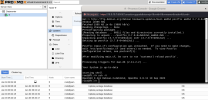Update version OpenSSH | current vulnerable version
- Thread starter yrestrepo
- Start date
You are using an out of date browser. It may not display this or other websites correctly.
You should upgrade or use an alternative browser.
You should upgrade or use an alternative browser.
The repo doesn't lie - you already have the version currently available in the repo: https://packages.debian.org/bookworm/ssh or https://tracker.debian.org/pkg/openssh
I assume you're referring to CVE-2023-51385 as well as CVE-2023-51384?
Both should be fixed in the bookworm-security version already, since the fixes get backported by Debian maintainers. You can check out the patches applied to the version here [1].
You can check the changelog via:
If the fixes don't show up in the changelog, then you would need to check whether you have the proper security repository configured.
[1] https://sources.debian.org/patches/openssh/1:9.2p1-2+deb12u2/
Both should be fixed in the bookworm-security version already, since the fixes get backported by Debian maintainers. You can check out the patches applied to the version here [1].
You can check the changelog via:
Code:
apt changelog sshIf the fixes don't show up in the changelog, then you would need to check whether you have the proper security repository configured.
[1] https://sources.debian.org/patches/openssh/1:9.2p1-2+deb12u2/
Thank you very much for your response, look, these are the repositories I have, I have not modified this, these are the default ones:I assume you're referring to CVE-2023-51385 as well as CVE-2023-51384?
Both should be fixed in the bookworm-security version already, since the fixes get backported by Debian maintainers. You can check out the patches applied to the version here [1].
You can check the changelog via:
Code:apt changelog ssh
If the fixes don't show up in the changelog, then you would need to check whether you have the proper security repository configured.
[1] https://sources.debian.org/patches/openssh/1:9.2p1-2+deb12u2/
root@ft:/etc/apt# cat sources.list
deb http://ftp.debian.org/debian bookworm main contrib
deb http://ftp.debian.org/debian bookworm-updates main contrib
# security updates
deb http://security.debian.org bookworm-security main contrib
I found this https://www.reddit.com/r/debian/comments/17s0q57/fix_openssh_vulnerability_cve202328531/ apparently debian deemed it lower risk and hasn't patched it yet for whatever reason...
Debian rarely updates the stable release of anything to a new version. They generally prefer to back-port the patch to the version in stable.
ETA: I'm using a Debian machine right now and the changelog found in /usr/share/doc/openssh-client shows this:
ETA: I'm using a Debian machine right now and the changelog found in /usr/share/doc/openssh-client shows this:
Code:
$ zless changelog.Debian.gz
openssh (1:9.2p1-2+deb12u2) bookworm-security; urgency=medium
* Cherry-pick from upstream:
- [CVE-2023-28531] ssh-add(1): when adding smartcard keys to
ssh-agent(1) with the per-hop destination constraints (ssh-add -h ...)
added in OpenSSH 8.9, a logic error prevented the constraints from
being communicated to the agent. This resulted in the keys being added
without constraints. The common cases of non-smartcard keys and keys
without destination constraints are unaffected. This problem was
reported by Luci Stanescu (closes: #1033166).
- [CVE-2023-48795] ssh(1), sshd(8): implement protocol extensions to
thwart the so-called "Terrapin attack" discovered by Fabian Bäumer,
Marcus Brinkmann and Jörg Schwenk. This attack allows a MITM to effect
a limited break of the integrity of the early encrypted SSH transport
protocol by sending extra messages prior to the commencement of
encryption, and deleting an equal number of consecutive messages
immediately after encryption starts. A peer SSH client/server would
not be able to detect that messages were deleted.
- [CVE-2023-51384] ssh-agent(1): when adding PKCS#11-hosted private keys
while specifying destination constraints, if the PKCS#11 token
returned multiple keys then only the first key had the constraints
applied. Use of regular private keys, FIDO tokens and unconstrained
keys are unaffected.
- [CVE-2023-51385] ssh(1): if an invalid user or hostname that contained
shell metacharacters was passed to ssh(1), and a ProxyCommand,
LocalCommand directive or "match exec" predicate referenced the user
or hostname via %u, %h or similar expansion token, then an attacker
who could supply arbitrary user/hostnames to ssh(1) could potentially
perform command injection depending on what quoting was present in the
user-supplied ssh_config(5) directive. ssh(1) now bans most shell
metacharacters from user and hostnames supplied via the command-line.
-- Colin Watson <cjwatson@debian.org> Tue, 19 Dec 2023 14:51:56 +0000
Last edited:


